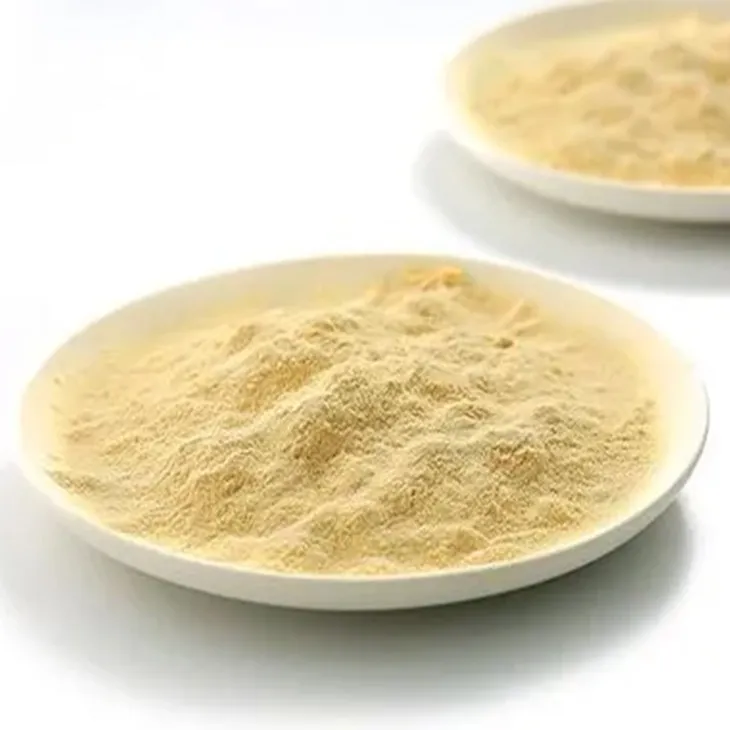- 0086-571-85302990
- sales@greenskybio.com
Understanding the Private Label of Selenium Yeast: A Comprehensive Guide
2024-12-16

1. Introduction
Selenium yeast has emerged as a significant product in various industries, especially in the fields of nutrition and animal feed. The private label of Selenium yeast adds another layer of complexity and opportunity. This comprehensive guide aims to explore every aspect of it, from its production and quality control to its market applications and unique features.

2. What is Selenium yeast?
Selenium is an essential micronutrient that plays a crucial role in many biological processes. Selenium yeast is a form of selenium that is bound to yeast. Yeast serves as a natural carrier, making selenium more bioavailable. It is produced through a fermentation process where yeast is cultured in a medium containing selenium. This process allows the yeast to incorporate selenium into its cellular structure.
There are different types of selenium yeast available in the market, which may vary in their selenium content, purity, and bioavailability. The quality of selenium yeast is determined by factors such as the strain of yeast used, the fermentation conditions, and the purification process.

3. Quality Control in Selenium Yeast Private Label
3.1 Raw Material Selection
The first step in quality control for selenium yeast private label is the careful selection of raw materials. High - quality yeast strains are chosen based on their ability to efficiently incorporate selenium. These strains should be free from contaminants and have a stable genetic makeup.
The source of selenium also matters. It should be of high purity and preferably from a reliable supplier. Traceability of the raw materials is crucial to ensure that the final product meets the required quality standards.
3.2 Fermentation Process Monitoring
During the fermentation process, strict monitoring is essential. Parameters such as temperature, pH, and nutrient availability need to be controlled precisely. Deviations in these parameters can affect the growth of yeast and the incorporation of selenium.
For example, if the temperature is too high or too low, it can lead to a decrease in the efficiency of selenium uptake by the yeast. Regular sampling and analysis of the fermentation broth are carried out to measure the selenium content and the growth of yeast.
3.3 Purification and Testing
After fermentation, the selenium - yeast complex needs to be purified. This involves removing any unwanted by - products or impurities. The purification process should be carefully designed to maintain the integrity of the selenium - yeast complex.
Comprehensive testing is then performed. This includes tests for selenium content, purity, and bioavailability. Analytical methods such as atomic absorption spectroscopy or inductively coupled plasma - mass spectrometry are often used to accurately measure the selenium content. Bioavailability tests may involve in - vitro or in - vivo studies to determine how well the selenium in the yeast can be absorbed and utilized by organisms.
4. Market Applications of Selenium Yeast Private Label
4.1 Human Nutrition
In human nutrition, selenium yeast private label products are used in dietary supplements. Selenium is known for its antioxidant properties, which help protect cells from oxidative damage. It also plays a role in thyroid function, immune system support, and DNA synthesis.
Dietary supplements containing selenium yeast are often targeted towards individuals with selenium deficiency or those who want to enhance their overall health. These products are available in various forms, such as tablets, capsules, and powders.
4.2 Animal Feed
In the animal feed industry, selenium yeast is a valuable additive. It is used to supplement the diet of livestock, poultry, and aquaculture species. Selenium is essential for the proper growth, reproduction, and immune function of animals.
For example, in poultry, selenium yeast helps improve egg production, hatchability, and the quality of meat. In livestock, it can enhance the resistance to diseases and improve the efficiency of feed conversion.
5. Unique Features of Selenium Yeast Private Label
5.1 Bioavailability
One of the most significant features of selenium yeast private label is its high bioavailability. Compared to other forms of selenium, such as inorganic selenium salts, selenium yeast is more easily absorbed by the body. This is because the selenium is bound to the yeast in a form that is recognized by the body's digestive system.
The bioavailability of selenium yeast also makes it a more effective supplement, as a smaller dose can achieve the same physiological effects as a larger dose of inorganic selenium.
5.2 Safety Profile
Selenium yeast has a relatively good safety profile. When produced under proper quality control conditions, it has a low risk of toxicity. In contrast, excessive intake of inorganic selenium can lead to selenium toxicity, which can cause symptoms such as hair loss, nail brittleness, and neurological problems.
The safety of selenium yeast is especially important in applications such as human nutrition and animal feed, where the product is consumed regularly.
6. Challenges in the Selenium Yeast Private Label Market
Despite its many advantages, the selenium yeast private label market also faces some challenges. One of the main challenges is competition. There are many players in the market, both large and small, and standing out requires a combination of high - quality products, effective marketing, and competitive pricing.
Another challenge is regulatory compliance. Different regions may have different regulations regarding the production, labeling, and marketing of selenium yeast products. Manufacturers need to ensure that they are fully compliant with all relevant regulations to avoid legal issues.
Additionally, consumer awareness and education are important factors. Many consumers may not be fully aware of the benefits of selenium yeast or may be confused by the different products available in the market. Educating consumers about the unique features and benefits of selenium yeast private label products can help increase market demand.
7. Conclusion
The private label of selenium yeast is a complex and dynamic area with great potential. Through strict quality control, diverse market applications, unique features, and by addressing the challenges it faces, the selenium yeast private label can continue to grow and make a significant impact in the fields of human nutrition, animal feed, and other related industries. Understanding all aspects of it, from production to market, is crucial for both manufacturers and consumers alike.
FAQ:
Q1: What is Selenium Yeast?
Selenium Yeast is a type of yeast that has been enriched with selenium. It is often used as a dietary supplement or in food fortification due to selenium's importance in various biological functions in the body, such as antioxidant activity and thyroid function support.
Q2: Why is quality control important for Selenium Yeast private label?
Quality control is crucial for Selenium Yeast private label. Firstly, it ensures that the selenium content is accurate and consistent, which is vital for its effectiveness in providing the necessary selenium to consumers. Secondly, it helps to prevent contamination by other substances, safeguarding the safety of the product. Moreover, strict quality control measures can also ensure the stability and shelf - life of the Selenium Yeast product.
Q3: What are the main market applications of Selenium Yeast private label?
The Selenium Yeast private label has several market applications. In the dietary supplement industry, it is popular as a source of selenium for those who may have a deficiency or are looking to support their overall health. In the food and beverage industry, it can be used for fortification purposes, for example, in bread, cereals, and functional drinks. Additionally, in the animal feed market, it can be added to animal feed to improve the selenium status of livestock, which in turn can affect the quality of meat, milk, and eggs.
Q4: What are the unique features of Selenium Yeast?
One of the unique features of Selenium Yeast is its natural form. Compared to inorganic selenium sources, Selenium Yeast provides selenium in an organic form that is more easily absorbed and utilized by the body. It also has a relatively stable chemical structure, which allows for better storage and handling. Another feature is that it can be produced in a way that is suitable for different applications, whether it is for human consumption or for animal feed.
Q5: How can consumers ensure the quality of Selenium Yeast private label products?
Consumers can ensure the quality of Selenium Yeast private label products in several ways. They can look for products from reputable manufacturers who follow strict quality control and manufacturing standards. Checking for third - party certifications, such as those from recognized testing laboratories, can also be helpful. Additionally, reading product labels carefully for information on selenium content, ingredients, and any potential allergens is important.
Related literature
- Selenium Yeast in Nutrition: A Review of Its Properties and Applications"
- "Quality Assurance in Selenium Yeast Production: Best Practices"
- "The Market Potential of Selenium Yeast - based Products"
- ▶ Hesperidin
- ▶ Citrus Bioflavonoids
- ▶ Plant Extract
- ▶ lycopene
- ▶ Diosmin
- ▶ Grape seed extract
- ▶ Sea buckthorn Juice Powder
- ▶ Fruit Juice Powder
- ▶ Hops Extract
- ▶ Artichoke Extract
- ▶ Mushroom extract
- ▶ Astaxanthin
- ▶ Green Tea Extract
- ▶ Curcumin
- ▶ Horse Chestnut Extract
- ▶ Other Product
- ▶ Boswellia Serrata Extract
- ▶ Resveratrol
- ▶ Marigold Extract
- ▶ Grape Leaf Extract
- ▶ New Product
- ▶ Aminolevulinic acid
- ▶ Cranberry Extract
- ▶ Red Yeast Rice
- ▶ Red Wine Extract
-
Sophora Flavescens Root Extract
2024-12-16
-
Bamboo Leaf extract
2024-12-16
-
Curcumin
2024-12-16
-
Polygonum Cuspidatum Extract
2024-12-16
-
Black Garlic Extract
2024-12-16
-
Citrus Aurantii Extract
2024-12-16
-
Natural grape seed extract
2024-12-16
-
Polygonum multiflorum extract
2024-12-16
-
Mangosteen extract powder
2024-12-16
-
Panax Ginseng Leaf Extract
2024-12-16





















